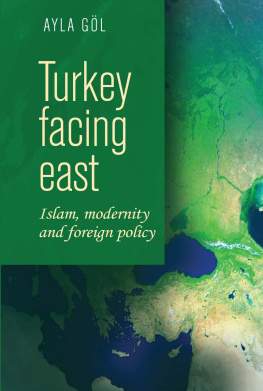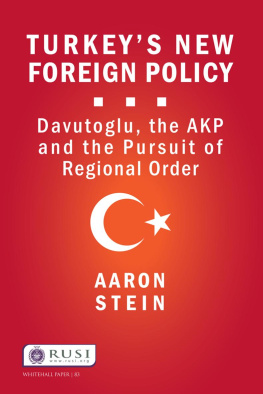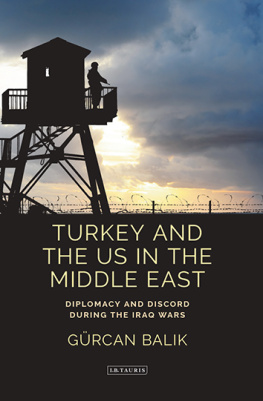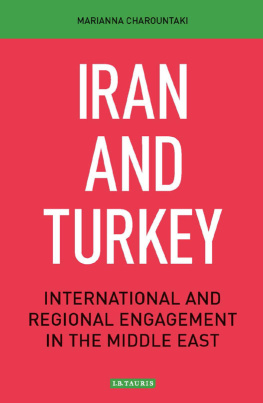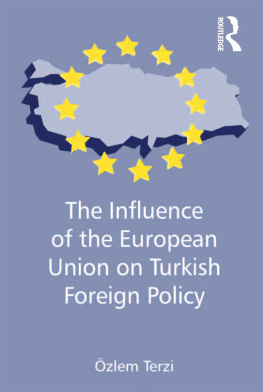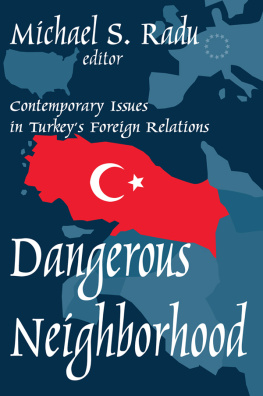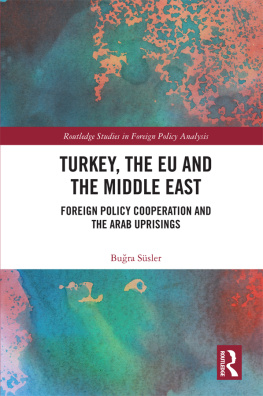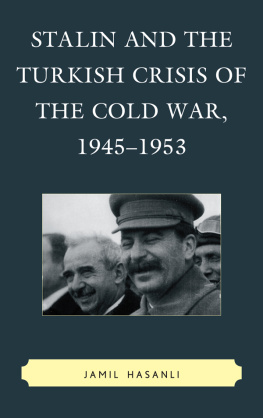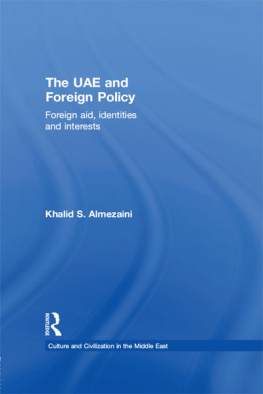Turkey facing east
Islam, modernity and foreign policy
Ayla Gl
Manchester University Press
Manchester and New York
distributed in the United States exclusively by Palgrave Macmillan
Copyright Ayla Gl 2013
The right of Ayla Gl to be identified as the author of this work has been asserted by her in accordance with the Copyright, Designs and Patents Act 1988.
Published by Manchester University Press
Oxford Road, Manchester M13 9NR, UK
and Room 400, 175 Fifth Avenue, New York, NY 10010, USA
www.manchesteruniversitypress.co.uk
Distributed in the United States exclusively by
Palgrave Macmillan, 175 Fifth Avenue, New York,
NY 10010, USA
Distributed in Canada exclusively by
UBC Press, University of British Columbia, 2029 West Mall,
Vancouver, BC, Canada V6T 1Z2
British Library Cataloguing-in-Publication Data
A catalogue record for this book is available from the British Library
Library of Congress Cataloging-in-Publication Data applied for
ISBN 978 0 7190 9075 2
First published 2013
The publisher has no responsibility for the persistence or accuracy of URLs for any external or third-party internet websites referred to in this book, and does not guarantee that any content on such websites is, or will remain, accurate or appropriate.
Typeset by
Servis Filmsetting Ltd, Stockport, Cheshire
Contents
Maps
1 The TurkishRussian borders, 19141921
Source: Modified and reproduced from The Times Atlas of World History, Geoffrey Barraclough, ed., London, Times Books, 1993
2 The borders in dispute in the South Caucasus, 19191921
Source: Public Record Office, Kew, London, FO371/6269/E3435/55/58/, 17 March 1921
4 Wilsonian boundaries, 1920
Source: Papers Relating to the Foreign Relations of the United States,Vol. III, 1920, US Government Printing office, 1920, http://digitallibrary-wisc.edu/1711.d1/FRUS.FRUS
5 The boundaries of the modern Turkish state
Source: CIA, The World Factbook, Turkey, www.cia.gov/library/publications/the-world-factbook/geos/tu.html (access 14 May 2013)
Preface
This book is, first of all, a result of my intellectual curiosity about the relationship between Islam, modernity and foreign policy in Turkey. Both the complexity of the relationship between Islam and modernity, and the necessary conditions of the Turkish transformation from an Islamic empire to a modern state are usually ahistorically defined and poorly understood in the existing literature. Furthermore, despite Turkeys geo-political and geo-cultural existence in-between the West and the East, the majority of works tend to focus almost exclusively on Turkeys engagement with the West in the process of its transition to a secular nation-state. I wanted to write a book which offers a critical analysis of the Turkish state transformation with reference to the complex interplay between Islam, modernity and foreign policy.
In doing so, this book makes three claims. First, it offers a new historical account of the Turkish state transformation, which highlights the importance of Eastern affairs during Turkeys transition from an Islamic empire to a modern nation-state. Existing studies have tended to focus almost exclusively on Turkeys engagement with Europe, and its subsequent pro-Western orientation and foreign policies in the early twentieth century. These studies, however, are somewhat blind to the important role played by Turkish nationalists interactions with its Eastern neighbours Armenia, Azerbaijan, Georgia and the Soviet Union in establishing and legitimising the transitional regimes existence in the European-dominated international system; they also fail to properly analyse the crucial role of KemalistLeninist engagement in the making of Turkey as a modern state. This book advances a new interpretation of this crucial historical juncture by arguing that the Turkish nationalists under Atatrk successfully resolved Turkeys nationalist disputes with their Eastern neighbours to cement their claims to sovereign authority over clearly demarcated territorial borders, thus legitimising their claims between 1918 and 1921 to modern statehood. Furthermore, by attaining the recognition of Turkish sovereignty from its neighbours in the East as opposed to the West they overrode Armenian territorial claims to Eastern Anatolia. Such an unorthodox reading of Turkish history highlights the long-neglected origins of Turkeys Eastern orientation as a response to changing geopolitics and balances of power at the beginning of the twentieth century.
Second, this book turns the spotlight on the historical origins of the ethnonationalist tensions between Turks, Armenians and Kurds, which continues to haunt Turkish politics to the present day. Existing studies have tended to look at this issue in an ahistorical manner, preferring to concentrate on the highly politicised debate over whether or not the mass killings of Armenians took place. While this issue is important, focusing solely on this particular aspect of Turkish politics does not help us understand the historical origins of this ongoing dispute, which can be seen as one of the key obstacles to Turkeys European Union (EU) membership. This book therefore makes an important contribution by examining the process by which on-going competition between different nationalisms emerged among the successor states of the Ottoman Empire in the Middle East and the South Caucasus.
Third, this book highlights important historical continuities in Turkeys engagement with its Eastern neighbours. Turkey has long denied its cultural and Islamic connections in the East and relied on its relations with the West in international politics. However, at the beginning of the twenty-first century, the current pro-Islamic AKP (Adalet ve Kalkinma Partisi the Justice and Development Party) government has shifted its foreign policy towards the Middle East by emphasising its cultural and historical soft power. Conventional studies, which tend to overemphasise the importance of the West to Turkish foreign policy, cannot offer nuanced historical insights into Ankaras turn to the East, and treat it as if it was an entirely new and unexpected development. This book thus challenges many of the predominant assumptions about Turkeys unconditional pro-Western alignment by showing how Turkish foreign policy has historically oscillated between the West and the East. Furthermore, it emphasises the importance of the interplay between domestic and foreign relations during the creation of the modern state in a Muslim context based on European modernity. As such, it is better placed to analyse the historical continuities and changes in Turkeys Eastern engagement. Moreover, it highlights the relevance of Turkeys unique experience for Arab successor states of the Ottoman Empire in the contemporary Middle East. It warns the reader to be cautious about some premature conclusions in relation to the outcome of the Arab Spring. The findings prove that transition from authoritarian rule to a democratic and secular nation-state is possible in a Muslim society, but it is a long and complex historical process.
Acknowledgements
This is a long overdue book. At last, I am delighted to be able to thank many institutions, colleagues and friends who have been part of an intellectual journey stretching from Australia, England and Turkey to Wales. At the London School of Economics (LSE), Christopher Hill, who is now based at Cambridge University, was a great source of wisdom that guided me along the way to combining theory and history in the analysis of foreign policy. Fred Halliday offered the most valuable criticisms that made me aware of the importance of historical understanding of the international relations of the Middle East and strongly recommended the publication of this book. I was deeply saddened by his premature death.

